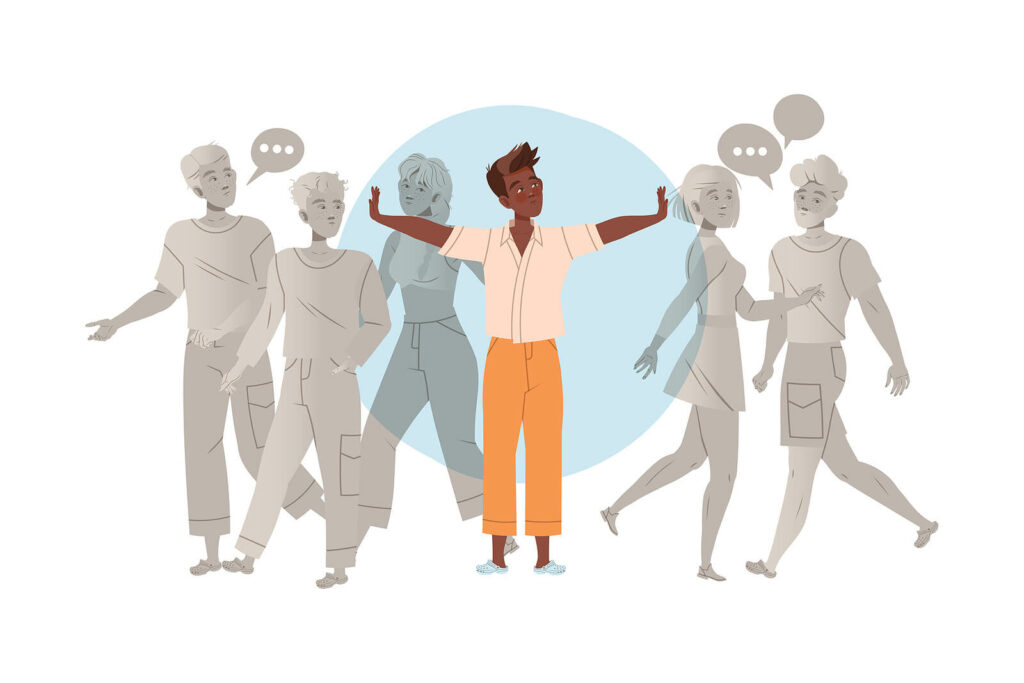Enmeshment trauma, or sometimes called emotional incest, refers to a family system that lacks boundaries. In an enmeshed family, the parents or caregiver inappropriately relies on the child to meet their emotional needs. The child, in turn, is not allowed to be emotionally independent. Therefore, becomes more attuned to their parents’ needs than their own.
Enmeshment is detrimental to the child’s individual autonomy. The unhealthy attachment to the parent leaves little room for the child’s own growth and development. It’s hard to understand what your needs and wants are when you’re always focused on someone else’s. Particularly, someone whose responsibility is to be caring for you instead. This lack of individuality results in a child who overidentifies with their caretaker.
An enmeshed family does not allow for a healthy parent-child relationship. The parent may grow accustomed to having their needs catered to which can lead to them becoming overprotective, controlling, and intrusive. The parent may have a difficult time being alone, claiming that they must always be with their child. Children of enmeshment trauma are seen as equals or friends; this can even make them feel special. When boundaries are blurred in this way, the child is put in a position where they may feel they have no choice but to attend to their parents.

Enmeshment trauma can be caused by dysfunction and abuse within the family system. It can include physical, sexual, or emotional abuse, neglect, and mental health or substance abuse issues. If a family member suffers from mental illness or addiction, they may avoid treating the problem by dismissing it. Other members, in the role of peacemaker, may defend the problematic behavior and guilt others into forgiving it.
Here are some signs and characteristics of enmeshment trauma:
- Lack of physical and emotional boundaries
- Difficulty with independence, i.e., relying on others for validation, requiring excessive reassurance
- Feeling responsible for other people’s behavior, thoughts, feelings, or well-being
- A lack of personal space or identity
- Having involvement with others, i.e., having your physical space invaded or sharing every intimate detail of your life
- Feeling shame or guilt for setting boundaries, having a different opinion, or making a choice that’s in your best interest
- Constantly choosing to put others’ wants and needs over your own
- A tendency to avoid conflict
How is enmeshment trauma impactful?
If you were raised in an enmeshed family, it is likely that you are repeating these dysfunctional patterns in your adult life. Enmeshment trauma can lead to a host of issues including feelings of low self-worth, a poor sense of self, and a fear of abandonment.
As an enmeshed child, your parents’ lives centered around yours making it difficult for you to see yourself as separate from them. Your parents likely had a negative reaction to you moving out of the home, starting a relationship, beginning a career, and any other significant event indicative of your independence.
Growing up your family was extremely close, and you felt certain of your role within the family dynamic. However, as an adult, you may experience confusion as to who you are outside of this role and/or the family.

In relationships, you may have trouble asserting yourself or openly communicating what you want or need from your partner. Intimate relationships may often be codependent, unstable, and/or abusive. Nonetheless, if boundaries were never modeled for you then you will have a hard time setting them and respecting them.
How to heal from enmeshment trauma?
If you can identify with any of the dysfunctional patterns resulting from enmeshment trauma there are ways that you can unlearn these patterns and develop a healthier lifestyle. If you want to explore more ways, reach out to Kind Mind Psychology. Our trauma therapists are here to support you.
Set healthy boundaries.
To start, you will need to learn how to establish and maintain appropriate boundaries with others. Boundaries allow you to feel close and connected to others while maintaining your sense of self. This means being clear about your needs and wants and respecting your thoughts and feelings even if it disrupts the peace.
Discover who you are.

Firstly, so much of your life has been spent revolving around someone else. It’s time for you to explore the world independently. Figure out who you are, what you like, and what you don’t like. Set goals for yourself. Grow your self-confidence. In your self-exploration, you can have opinions, prioritize your values, and make decisions in your best interest.
Practice self-compassion.
Many of these practices will be new to you. You may feel guilt for focusing on yourself or setting limits with your family. Your feelings are valid, remember to be patient and kind to yourself. Self-care is not selfish.
Trauma Treatment in Charlotte, NC: Finding Healing & Rediscovering Yourself
If you’re struggling to break free from patterns of enmeshment and reclaim your sense of self, trauma therapy can provide the support you need to heal. At Kind Mind Psychology, we understand the lasting impact of enmeshment trauma and offer a safe, compassionate space to explore and establish healthy boundaries. With the guidance of our experienced therapists, you’ll be empowered to rediscover your identity and build a life centered around your own needs and aspirations.
- Reach out today to start your journey toward healing.
- Explore more trauma recovery insights by reading our blogs.
- Begin trauma therapy and live with more peace in your life!
Other Services We Offer in New York and North Carolina
In addition to trauma treatment, we offer group therapy that creates a welcoming space where you can connect with others, share experiences, and feel empowered as part of a supportive community. For those within the LGBTQIA+ community, our LGBTQIA+ therapy is a compassionate and affirming space where you can explore your identity and celebrate who you are. Additionally, we offer couples therapy, helping partners strengthen their bond. If you’re looking to enhance your trauma recovery, our specialized EMDR therapy and Internal Family Systems (IFS) therapy can guide you toward lasting healing and emotional resilience. Whatever you’re facing, we’re here to help you thrive.

